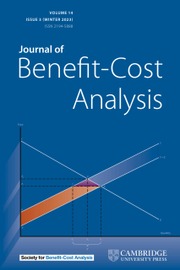Crossref Citations
This article has been cited by the following publications. This list is generated based on data provided by
Crossref.
Carlson, Deven E.
Ripberger, Joseph T.
Jenkins-Smith, Hank C.
Silva, Carol L.
Gupta, Kuhika
Berrens, Robert P.
and
Jones, Benjamin A.
2016.
Contingent Valuation and the Policymaking Process: An Application to Used Nuclear Fuel in the United States.
Journal of Benefit-Cost Analysis,
Vol. 7,
Issue. 3,
p.
459.
Robinson, Lisa A.
2016.
[Ir]rationality, Happiness, and Benefit-Cost Analysis: Introduction to the Special Issue.
Journal of Benefit-Cost Analysis,
Vol. 7,
Issue. 1,
p.
1.
Kip Viscusi, W.
and
Gayer, Ted
2016.
Rational Benefit Assessment for an Irrational World: Toward a Behavioral Transfer Test.
Journal of Benefit-Cost Analysis,
Vol. 7,
Issue. 1,
p.
69.
Phelps, Charles
and
Madhavan, Guruprasad
2018.
Resource allocation in decision support frameworks.
Cost Effectiveness and Resource Allocation,
Vol. 16,
Issue. S1,
Verbooy, Kaya
Hoefman, Renske
van Exel, Job
and
Brouwer, Werner
2018.
Time Is Money: Investigating the Value of Leisure Time and Unpaid Work.
Value in Health,
Vol. 21,
Issue. 12,
p.
1428.
Wang, Xueyan
Adamowski, Jan F
Wang, Guangda
Cao, Jianjun
Zhu, Guofeng
Zhou, Junju
Liu, Chunfang
and
Dong, Xiaogang
2019.
Farmers’ Willingness to Accept Compensation to Maintain the Benefits of Urban Forests.
Forests,
Vol. 10,
Issue. 8,
p.
691.
Robinson, Lisa A.
Hammitt, James K.
and
O’Keeffe, Lucy
2019.
Valuing Mortality Risk Reductions in Global Benefit-Cost Analysis.
Journal of Benefit-Cost Analysis,
Vol. 10,
Issue. S1,
p.
15.
Garrison, Louis P.
Jackson, Tristen
Paul, Douglas
and
Kenston, Mike
2019.
Value-Based Pricing for Emerging Gene Therapies: The Economic Case for a Higher Cost-Effectiveness Threshold.
Journal of Managed Care & Specialty Pharmacy,
Vol. 25,
Issue. 7,
p.
793.
Koopmans, Carl
and
Mouter, Niek
2020.
Standard Transport Appraisal Methods.
Vol. 6,
Issue. ,
p.
1.
Mauskopf, Josephine
Masaquel, Catherine
and
Huang, Liping
2021.
Evaluating Vaccination Programs That Prevent Diseases With Potentially Catastrophic Health Outcomes: How Can We Capture the Value of Risk Reduction?.
Value in Health,
Vol. 24,
Issue. 1,
p.
86.
Keller, Elena
Newman, Jade E.
Ortmann, Andreas
Jorm, Louisa R.
and
Chambers, Georgina M.
2021.
How Much Is a Human Life Worth? A Systematic Review.
Value in Health,
Vol. 24,
Issue. 10,
p.
1531.
Garrison, Louis P
Jiao, Boshen
and
Dabbous, Omar
2021.
Gene therapy may not be as expensive as people think: challenges in assessing the value of single and short-term therapies.
Journal of Managed Care & Specialty Pharmacy,
Vol. 27,
Issue. 5,
p.
674.
Jiang, Fan
Meng, Sisi
Khan, Mohammad
Halim, Nafisa
and
Mozumder, Pallab
2023.
Estimating willingness to pay and costs associated with hurricane evacuation.
Transportation Research Part D: Transport and Environment,
Vol. 121,
Issue. ,
p.
103826.
Mussio, Irene
Chilton, Susan
Duxbury, Darren
and
Nielsen, Jytte Seested
2024.
A risk–risk trade‐off assessment of climate‐induced mortality risk changes.
Risk Analysis,
Vol. 44,
Issue. 3,
p.
536.


